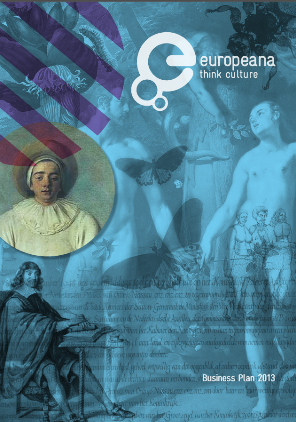Europeana Business Plan 2013 published
Europeana is pleased to announce that the Europeana Business Plan 2013 is now available for download.
The Business Plan has been put together in consultation with the Europeana Network through a variety of workshops and meetings, and so is the result of much discussion and collaboration. We would like to thank all those who have contributed; we feel that this plan will provide us with real guidance over the coming year and truly reflects the priorities that we have set together.

Download the Europeana Business Plan 2013
As stated in the introduction to the document:
Europeana is part of an ever-expanding ecosystem. This is reflected in the number of projects, both technical and content-driven, the number of providers and aggregators, its funding and its current governance. The Strategic Plan 2011-2015 is now halfway through its life. Each year, the Business Plan prioritises work according to the overall vision and the needs of the Network. 2013 is pivotal as the year in which emphasis can go into distribution and the year in which Europeana should start to show a return on investment. Release of the metadata under a CC0 waiver creates huge opportunities to place culture in the workflow of users but also delivers massive challenges in the development of a distributed system in which the portal is a channel in a wider family of services. Prioritisation needs to strike a balance between achieving the longer term vision of providing new forms of access to cultural heritage, inspiring creativity and stimulating social and economic growth, and being able to deliver to expectations.
This year, the Europeana Foundation and Network have identified three main areas to focus on:
- The first is that Europeana needs to behave as an ecosystem, a community of shared interests and mutual dependencies. We will ensure that this is reflected in the ways that we communicate with each other and solve problems together, for example in the Task Forces. By acting as a movement, we can greatly increase our impact both inside and outside of the sector.
- The second area of focus is our development into a Core Service Platform. This reflects the need for the Europeana Foundation to act as a facilitator - a catalyst of change in the cultural heritage sector. This means that we will work on developing interoperable resources and standards, including the source code, the dataset, the Europeana Data Model, the Licensing Framework and the API. Anyone in the cultural heritage sector and the creative industries should be able to benefit from this work to build new, innovative services.
- Finally, we will concentrate on showcasing the value of opening up. Now that we have released the dataset under the CC0 waiver, we are in a much better position to develop valuable new services on top of the API and Linked Open Data set that will bring more visibility and re-usage for your content. We will work with you on establishing impact indicators and develop case studies to highlight the value that open data can create.
You will see these priorities reflected across all of the work we do in the 4 strategic tracks (Aggregate, Facilitate, Distribute and Engage) through which we organise our activities. Even more than what we do, this will dictate how we do our work: always as a collective of partners, in a facilitative role, and with a strong belief that opening up access to our collective memory will contribute to a better shared understanding of our cultures and support a strong knowledge economy in Europe.
Keep an eye on this blog for information on our progress throughout the year.

